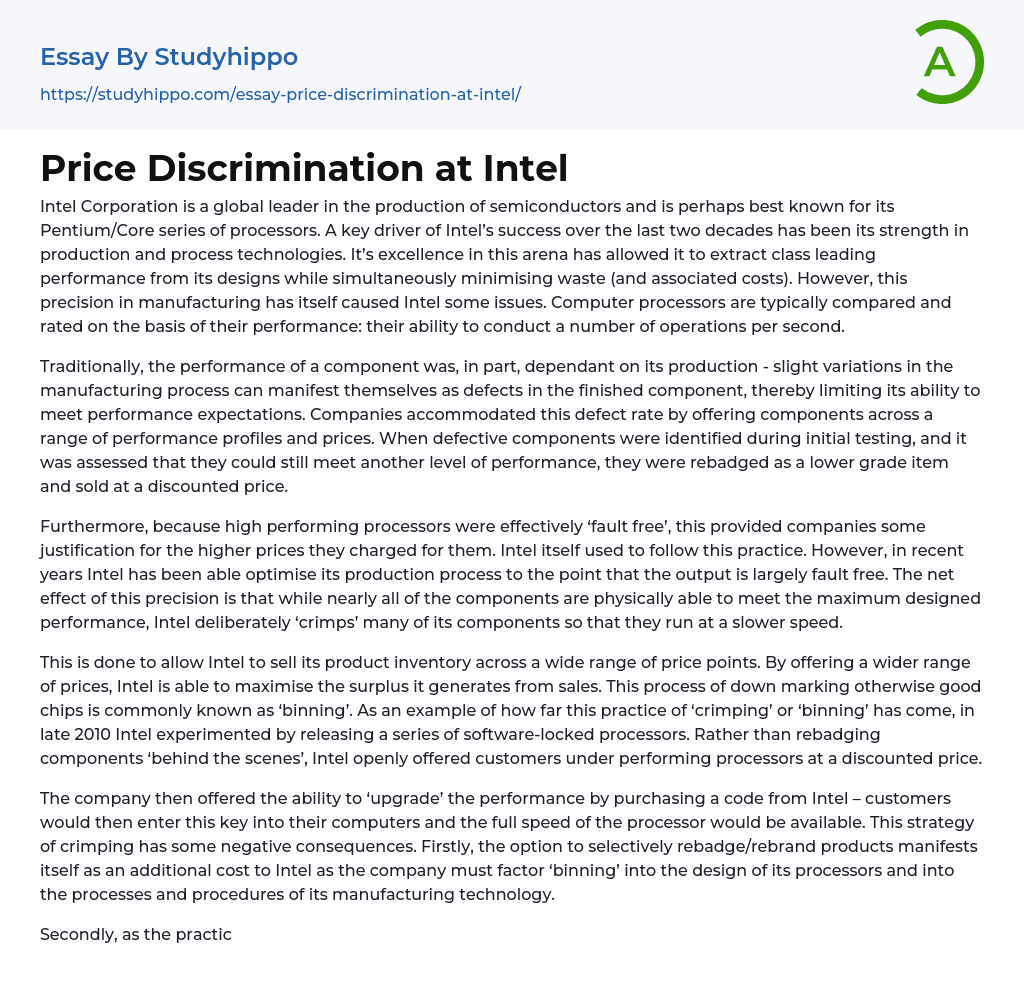Intel Corporation is a global leader in the production of semiconductors and is perhaps best known for its Pentium/Core series of processors. A key driver of Intel’s success over the last two decades has been its strength in production and process technologies. It’s excellence in this arena has allowed it to extract class leading performance from its designs while simultaneously minimising waste (and associated costs). However, this precision in manufacturing has itself caused Intel some issues. Computer processors are typically compared and rated on the basis of their performance: their ability to conduct a number of operations per second.
Traditionally, the performance of a component was, in part, dependant on its production - slight variations in the manufacturing process can manifest themselves as defects in the finished component, thereby limiting its ability
...to meet performance expectations. Companies accommodated this defect rate by offering components across a range of performance profiles and prices. When defective components were identified during initial testing, and it was assessed that they could still meet another level of performance, they were rebadged as a lower grade item and sold at a discounted price.
Furthermore, because high performing processors were effectively ‘fault free’, this provided companies some justification for the higher prices they charged for them. Intel itself used to follow this practice. However, in recent years Intel has been able optimise its production process to the point that the output is largely fault free. The net effect of this precision is that while nearly all of the components are physically able to meet the maximum designed performance, Intel deliberately ‘crimps’ many of its components so that they
run at a slower speed.
This is done to allow Intel to sell its product inventory across a wide range of price points. By offering a wider range of prices, Intel is able to maximise the surplus it generates from sales. This process of down marking otherwise good chips is commonly known as ‘binning’. As an example of how far this practice of ‘crimping’ or ‘binning’ has come, in late 2010 Intel experimented by releasing a series of software-locked processors. Rather than rebadging components ‘behind the scenes’, Intel openly offered customers under performing processors at a discounted price.
The company then offered the ability to ‘upgrade’ the performance by purchasing a code from Intel – customers would then enter this key into their computers and the full speed of the processor would be available. This strategy of crimping has some negative consequences. Firstly, the option to selectively rebadge/rebrand products manifests itself as an additional cost to Intel as the company must factor ‘binning’ into the design of its processors and into the processes and procedures of its manufacturing technology.
Secondly, as the practice of binning has become more publically known, some customers have expressed feelings of anger and disgruntlement at the fact the product they are purchasing is not running at its true performance level. Finally, there is a small but vocal enthusiast community who act opportunistically by purchasing discounted processors in the knowledge they can ‘overclock’ them to meet or exceed the performance of Intel’s more expensive offerings.
- Chief Executive Officer essays
- Convenience Store essays
- Firm essays
- Training And Development essays
- Unilever essays
- Variable Cost essays
- Virgin Group essays
- Bargaining essays
- Entity essays
- Pest analysis essays
- Computer File essays
- Desktop Computer essays
- Servers essays
- Data collection essays
- Graphic Design essays
- Data Mining essays
- Cryptography essays
- Internet essays
- Network Security essays
- Android essays
- Computer Security essays
- World Wide Web essays
- Website essays
- Computer Network essays
- Application Software essays
- Computer Programming essays
- Computer Software essays
- Benchmark essays
- Information Systems essays
- Email essays
- Hypertext Transfer Protocol essays
- Marshall Mcluhan essays
- Virtual Learning Environment essays
- Web Search essays
- Etiquette essays
- Mainstream essays
- Vodafone essays
- Web Search Engine essays
- Networking essays
- Telecommunication essays
- Network Topology essays
- Telecommunications essays
- Programming Languages essays
- Object-Oriented Programming essays
- Java essays
- John Locke essays
- 9/11 essays
- A Good Teacher essays
- A Healthy Diet essays
- A Modest Proposal essays




